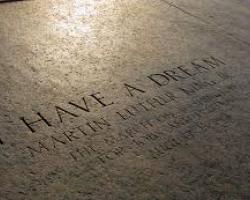Today is Martin Luther King Jr. Day, so naturally we remember Dr. King’s “I have a Dream” speech. As you may know, he delivered the stirring message in 1963 at the March on Washington, in a dramatic and impassioned call for an end to racism.
What you might not know is that his address to the nation is ranked by scholars as the top American speech in U.S. 20th century history! It still lives on for everyone moved by his dream of equality.
But some people, especially younger Americans, have forgotten the reason for MLK Day. To them it’s just another three-day weekend, like President’s Day. Mainly, they ponder whether to go to the shore or to the mountains or to stay at home and binge-watch Netflix.
One way we can be reminded and reinspired by Dr. King is by viewing the movie about a major episode in his dramatic life, Selma. This phenomonal film is racking up accolades and awards, including at the Golden Globes. Some believe it was snubbed at the Oscar — it’s nominated only for Best Picture and Best Song, and not for its many fine performances or the strong vision of its young, female, African-American director. You can see a trailer and find out more here. It’s playing at theaters in major markets throught the US.
Another thing we can do is to read the entire “Dream” speech here. Amazingly Dr. King almost didn’t deliver it because his adviser, the Rev. Wyatt Tee Walker, feared it was “hackneyed and trite.” Right before the march, Walker and his staff drafted a replacement titled, “Normalcy Never Again.” (Doesn’t quite have the same ring, does it?)
Gospel singer Mahalia Jackson is responsible for Dr. King’s change of heart; she called out to him, “Tell ’em about the dream, Martin” as he started speaking. He paused and said, “I still have a dream.”
Here is one small, electrifying snippet from his address to the crowd:
“I still have a dream, a dream deeply rooted in the American dream – one day this nation will rise up and live up to its creed, ‘We hold these truths to be self evident: that all men are created equal.’ I have a dream…”
Maybe you don’t consider yourself a dreamer. Most nurses are practical, ingenious workers and their patients and communities value them highly for their hands-on care. But most likely you do hold tight to dreams of equality, freedom, and compassion on Earth.
There are so many ways to affect social justice as a nurse, even if it’s just in your own little corner of the world. How does your heart and imagination inspire you to act? What is your dream for 2016? We’d love to hear about it.
Jebra Turner is a freelance health and business writer in Portland, Oregon. Visit her online at www.jebra.com.
- Resumes, LinkedIn, and HR Portal Profiles, Oh My! - May 22, 2020
- Weight Management for Nurses: The Why’s and How’s of Losing or Maintaining Weight - February 18, 2020
- Mindfulness and Wellness Programs for Patients - October 14, 2019



